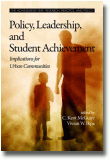
Policy, Leadership, and Student Achievement
Implications for Urban Communities
Edited by:
C. Kent McGuire
Vivian W. Ikpa
A volume in the series: The Achievement Gap, Research, Practice, and Policy. Editor(s): C. Kent McGuire. Vivian W. Ikpa.
Published 2008
This is the second book in the series examining student achievement. The chapters in this book reflect the scholarly papers presented at the July 2006 Education Policy, Leadership Summer Institute (EPLSI) by K–16 educators, researchers, community advocates, and policymakers who work in urban communities. The Institute serves as a place where individuals interested in scholarly discussions and research directly related to: (1) how data can be utilized to inform policy; (2) examining the urban school context from the perspectives of the polity, school leaders; students; and other related internal and external actors; and (3) identifying strategies for improving student academic achievement can gather. During this week-long Institute, participants examined the structural problems and policy tensions affecting urban communities and student achievement. The Institute’s theme, Meeting the Challenges of Urban Schools is reflected throughout this book. Specifically, this edition explores the interrelated aspects of policy, practice and research and how they affect academic achievement. The five sections in this book examine different challenges facing urban schools and their impact on student performance.
CONTENTS
Series Editors’ Introduction and Summary,
-
Paperback978-1-59311-973-7
Web price: $45.04 (Reg. 52.99)
-
Hardcover978-1-59311-974-4
Web price: $80.74 (Reg. 94.99)
- eBook9781607529330

-
 (Re)Envisioning Social Studies Education Research
Current Epistemological and Methodological Expansions, Deconstructions, and Creations
(Re)Envisioning Social Studies Education Research
Current Epistemological and Methodological Expansions, Deconstructions, and Creations
-
 Catalytic Improvement Communities
Cultivating Flourishing Schools
Catalytic Improvement Communities
Cultivating Flourishing Schools
-
 History Education and Historical Inquiry
History Education and Historical Inquiry
-
 Narrowing the Achievement Gap in a (Re) Segregated Urban School District
Research, Policy and Practice
Narrowing the Achievement Gap in a (Re) Segregated Urban School District
Research, Policy and Practice
-
 Qualitative Research With Diverse and Underserved Communities
Qualitative Research With Diverse and Underserved Communities
-
 Supporting Leaders for School Improvement Through Self-Care and Wellbeing
Supporting Leaders for School Improvement Through Self-Care and Wellbeing
-
 The Handbook for Aspiring Higher Education Leaders
The Handbook for Aspiring Higher Education Leaders

